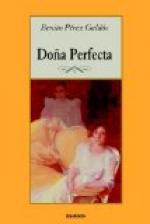but, truth to say, there was always a something, there
was always a line, invisible but which could not be
crossed between the improvised lady and the lady by
birth and ancestry. Dona Perfecta addressed Maria
as “thou,” while the latter could never
lay aside certain ceremonial forms. Maria Remedios
always felt herself so insignificant in the presence
of her uncle’s friend that her natural humility
had acquired through this feeling a strange tinge of
sadness. She saw that the good canon was a species
of perpetual Aulic councillor in the house; she saw
her idolized Jacintillo mingling on terms of almost
lover-like familiarity with the young lady, and nevertheless
the poor mother and niece visited the house as little
as possible. It is to be observed that Maria
Remedios’ dignity as a lady suffered not a little
in Dona Perfecta’s house, and this was disagreeable
to her; for in this sighing spirit, too, there was,
as there is in every living thing, a little pride.
To see her son married to Rosarito, to see him rich
and powerful; to see him related to Dona Perfecta,
to the senora—ah! this was for Maria Remedios
earth and heaven, this life and the next, the present
and the future, the supreme totality of existence.
For years her mind and her heart had been filled by
the light of this sweet hope. Because of this
hope she was good and she was bad; because of it she
was religious and humble, or fierce and daring; because
of it she was whatever she was—for without
this idea Maria, who was the incarnation of her project,
would not exist.
In person, Maria Remedios could not be more insignificant
than she was. She was remarkable for a surprising
freshness and robustness which made her look much
younger than she really was, and she always dressed
in mourning, although her widowhood was now of long
standing.
Five days had passed since the entrance of Caballuco
into the Penitentiary’s house. It was evening.
Remedios entered her uncle’s room with the lighted
lamp, which she placed on the table. She then
seated herself in front of the old man, who, for a
great part of the afternoon, had been sitting motionless
and thoughtful in his easy chair. His fingers
supported his chin, wrinkling up the brown skin, unshaven
for the past three days.
“Did Caballuco say he would come here to supper
to-night?” he asked his niece.
“Yes, senor, he will come. It is in a respectable
house like this that the poor fellow is most secure.”
“Well, I am not altogether easy in my mind,
in spite of the respectability of the house,”
answered the Penitentiary. “How the brave
Ramos exposes himself! And I am told that in Villahorrenda
and the surrounding country there are a great many
men. I don’t know how many men——What
have you heard?”
“That the soldiers are committing atrocities.”
“It is a miracle that those Hottentots have
not searched the house! I declare that if I see
one of the red-trousered gentry enter the house, I
shall fall down speechless.”




